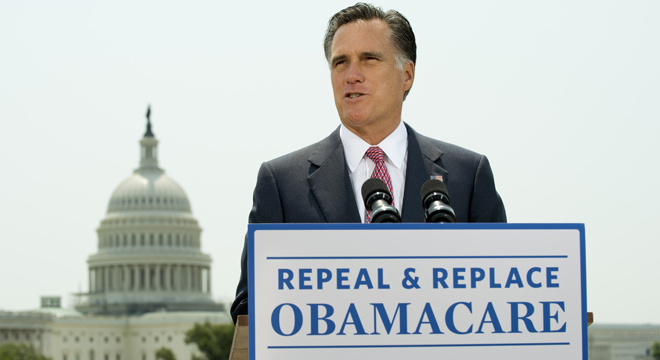Conservative health care experts are absolving their allies — and GOP presidential hopeful Mitt Romney — of responsibility for developing the Massachusetts health care reforms that ultimately inspired President Obama’s health care law.
“I’ve always been mystified by this casual assertion of equivalence,” economist Douglas Holtz-Eakin said Tuesday in Washington at a health care panel organized by the conservative advocacy groups American Action Network and Crossroads GPS.
Romney’s candidacy invites obvious comparisons between Obama’s Affordable Care Act and the very comparable health reforms Romney signed into law when he was governor of Massachusetts. It also serves as a reminder that the templates for what ultimately became “Romneycare” and then “Obamacare” were conservative — a Heritage Foundation white paper and several pieces of legislation authored by high-profile Republicans in Congress.
Now, under growing pressure to craft an alternative set of reforms, those who wish to repeal the ACA must elide this uncomfortable history, which reveals just how conservative Obama’s law is in many key ways.
On the trail, Romney ducks the issue by defending his law as an appropriate exercise of state-level power. But what about Washington conservatives, who may now feel like they bear some responsibility for the “Obamacare” Frankenstein? Should conservatives and elected Republicans take away any lessons about embracing reform ideas knowing they may become the seeds of future policy?
At the Tuesday panel, they denied that Romney’s Massachusetts reforms are broadly similar to the ACA. And to the extent they share anything in common, they hold Democratic legislators in Massachusetts largely responsible.
“It’s also worth looking at what Governor Romney proposed when he was governor and the bill he ended up signing into law, which was very much shaped by the legislature,” said Diana Furchtgott-Roth, a Manhattan Institute senior fellow. “It was very different from his original plan, which was a lot more bare-bones insurance and which grew into what it is today with the input of the legislature.”
Back in 2006, Romney did tussle with the legislature over some provisions that ultimately became law — most importantly a provision requiring employers to provide workers decent health insurance or pay a penalty. When Romney signed the law he vetoed that employer mandate and seven other, more minor provisions. All of those vetoes were overturned by the legislature.
Grace-Marie Turner, President of the Galen Institute, referenced her March article in the conservative American Spectator arguing that the differences between Romney’s initial proposal, the law that passed, and the Affordable Care Act are substantial enough to exculpate Romney from charges that he inspired Obama’s law.
But Romney’s own words — including a July 2009 USA Today op-ed and a 2006 PowerPoint presentation he gave at the conservative Heritage Foundation — illustrate the broad similarities between the law he still boasts about and the Affordable Care Act.
Jonathan Gruber, an MIT health care economist who was a key architect of both “Romneycare” and “Obamacare” famously takes issue with conservatives who overstate the differences between the two reforms.
“They’re the same fucking bill,” he told Capital late last year. “[Romney] just can’t have his cake and eat it too. Basically, you know, it’s the same bill. He can try to draw distinctions and stuff, but he’s just lying. The only big difference is he didn’t have to pay for his. Because the federal government paid for it. Where at the federal level, we have to pay for it, so we have to raise taxes.”
That didn’t stop Holtz-Eakin from giving it a go. He argued that the laws are substantially different — and that the Affordable Care Act essentially suffers from “Romneycare’s” myriad problems, along with many, many others.
“There’s nowhere in the Massachusetts reform all the 115 new bureaucracies, the innovation centers, the IPABs. There isn’t $500 billion of new taxes over the next 10 years. The notion that these are the same reforms — they have a couple of insurance components in common, but this is nothing like the Affordable Care Act.”
“Massachusetts was so broken — that was the only state where that would look like a good idea,” Holtz-Eakin added. “It’s just not working on any of the fronts that it was supposed to and the ACA has all those problems and a whole host more.”










